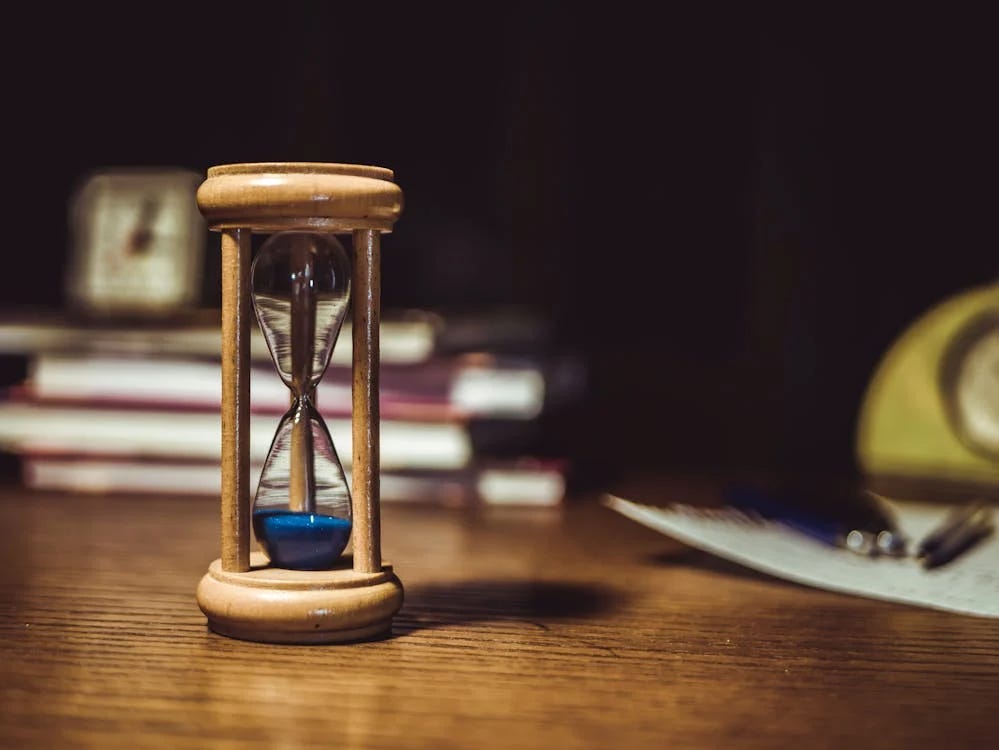Have you ever said to yourself: “I wish I had more time to write.”?
It sounds reasonable. It feels true. But is it?
If you’re reading this, chances are you have the desire to write. Not just a fleeting curiosity, but a real, persistent pull towards words.
You want to
capture thoughts
craft stories
share ideas
You want to build something meaningful with your voice.
Yet life is loud. Responsibilities pile up. Time slips away unnoticed. And writing, the thing you meant to make space for, gets pushed to the edges.
The edges of your energy
The edges of your attention
The edges of your week
Until one day you realize, it’s been weeks, months, maybe even years.
The question is not whether you have time, it’s how are you seeing time, and how are you seeing writing?
“No time” is not the real problem
When we say “I have no time,” we often mean:
I’m overwhelmed
I’m tired
I’m distracted
I’m scared to start
Or even:
I believe writing requires big blocks of quiet, uninterrupted hours that I don’t have.
These are not failures of time management, just failures of perspective.
Writing doesn’t always need hours. Sometimes, it just needs five minutes of honesty.
The myth of the perfect writing day, the cabin in the woods, the untouched hours, the absence of interruptions, has convinced many people that if they can’t have that, they can’t write at all.
But most great writing wasn’t born from perfect days. It was carved, word by word, from imperfect ones. Snatched from busy hours. Stolen between obligations. Written not despite life’s chaos, but within it.
Rethinking what “writing” means
Writing isn’t just the act of putting words on a page, it’s
how you think
how you observe
how you notice
Writing lives in your notes app, in scribbled sentences on the back of receipts, in voice memos recorded during a walk, in questions you ask yourself as you wash the dishes, in short thoughts when memories flashed through your mind.
If you only count writing as “me at a desk, with coffee, typing 1000 words”, you will almost always feel like you have no time.
But when you widen the lens?
You realize writing is everywhere. It’s already happening.
That shift alone can reconnect you to your words, even on the busiest days.
How to write when time feels scarce
When life feels full, writing doesn’t need to be abandoned. It needs to adapt.
Here are ways to keep moving, even in small steps:
1️⃣ Micro-writing moments
Five minutes can change everything.
One sentence is progress. A short paragraph is momentum. Writing, no matter how little, is progress.
Write between tasks, while waiting in line, before bed. Tiny moments add up. They keep you connected.
The question isn’t “Do I have enough time to write today?” It’s “can I write something, however small, right now?”
2️⃣ Voice notes & dictation
Who says writing needs fingers on keys?
Speak your thoughts. Record ideas. Dictate drafts. Turn your commute, your walks, even your workouts into creative time. Later, you can transcribe or refine.
Writing lives in the capturing of ideas, not just in the typing.
3️⃣ Writing over consuming
Be honest, how much time slips into scrolling, clicking, watching? Could ten minutes of that be reclaimed for your own words?
We often say “I have no time to create” while spending hours consuming.
One swaps energy for distraction.
The other builds something that lasts.
Choose accordingly.
4️⃣ Batch ideas, not just writing
When you can’t write full posts or essays, gather seeds.
Jot down potential titles
List questions you want to explore
Save quotes that inspire you
Capture stray thoughts before they vanish
These fragments reduce resistance when time finally opens up.
5️⃣ Reframe progress
Progress isn’t always publishing.
Outlining
Brainstorming
Editing
Reflecting
All these count. Give yourself permission to view every small step as writing.
Perfectionism says, “if it’s not a finished piece, it doesn’t count.” But reality says: “\everything counts.”
Why this approach works
Consistency isn’t built through ideal conditions, but through adaptability and finding ways to stay engaged, even when life is demanding.
These small habits compound:
You trust yourself more
Ideas come easier
Writing becomes part of how you move through life, not something you chase when life calms down
And something else happens. When you make space for writing, however small… time often opens up in return.
Because writing shifts how you see the world.
sharpens your focus
clarifies your thinking
turns ordinary moments into creative ones
What you’re really saying when you say “I have no time”
Sometimes “I have no time” is a cover story for:
“I’m scared my writing won’t be good”
“I’m overwhelmed by where to begin”
“I’m tired of writing for no one to notice”
“I don’t feel ready yet”
These are all valid feelings, but they aren’t solved by waiting for more time.
They’re solved by writing anyway.
Through the uncertainty
Through the fear
Through the exhaustion
Because the act of writing is the solution. Not the reward for finding more time.
Writing is a way of living
If writing matters to you, it belongs in your life as it is, not the life you imagine you’ll have later.
Write tired. Write busy. Write between things. Write on good days and bad ones.
Because writing isn’t just what you produce. It’s how you stay connected to yourself, how you process the world, how you leave something behind.
If you wait for time to be easy…you may wait forever.
Do I have time to write?
Ask: “What small way can I stay connected to my writing, even when time feels scarce?”
One sentence today
One idea tomorrow
One habit in the future
This builds a bridge between now and the writer you’re becoming.
Time is always passing. The question is, what are you writing as it does?
Do you have time to write now?
Dare to fail so you can dare to win - Moon AricaExpand your comfort zone here, tell me your thoughts:
Do you have time to write?
Do have have no time to write?
More on writing:
Thanks for reading!







I often feel tired, and writing an article looks like an uphill battle. I have many subjects to write about, and so little time to develop them.
It drives me crazy.
This feels well timed. I've gone from 2 posts a week like clockwork, to one post in the last two weeks.
It's not because I'm not writing, I am, it's because I've lost the momentum with editing. Where I either enjoyed it, or forced myself to tidy up my rambling, I've just got far more important things to do right now, so it takes a back seat.
But, maybe I don't have to polish something so I can see my face in it, maybe a rough something is better than a shiny nothing.